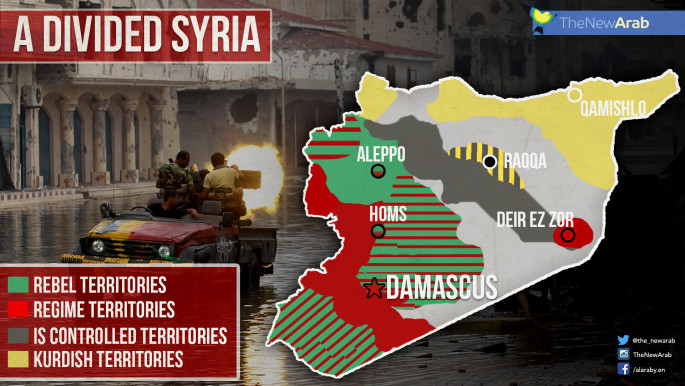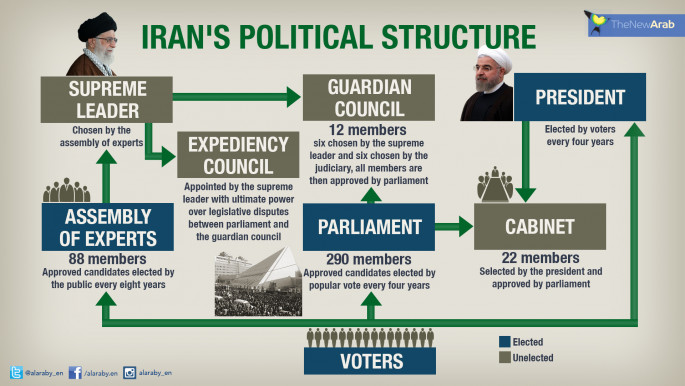Will Iran be the Syrian regime's last standing ally?
Pro-Tehran media have suggested Iran is making a limited withdrawal from Syria with the Republican Guard's 25th 'Karbala' brigade recalled home.
Although the reports in the pro-regime outlet have not yet been confirmed, it is undeniable that Iran is suffering heavy losses in Syria. Over 700 troops and pro-Tehran militants have been killed in Syria fighting since 2012.
In one incident last week, 12 Iranian fighters died in a battle with Syrian rebels, with their bodies still held by the opposition.
Such a considerable death toll highlights the lengths Tehran will go to keep Bashar al-Assad in power, but many ordinary Iranians are wondering if the sacrifice is worth it.
"Iran is providing quite significant economic and military support to Syria," said Sanam Vakil, associate fellow at Chatham House.
"Syria's support for Iran during the Iran-Iraq war has not been forgotten, especially when all other Arab countries were against Tehran. Iran's relationship with Syria has been important to it for the past four decades."
| Read more: Guardians of Karbala: Iran's strikeforce, from Iraq to Aleppo |
Leading the way
Iran entered the war with Republican Guard officers acting as advisers. As the Syrian army has been hit hard by casualties and desertions, Damascus is relying on Iranian commanders and militants on the battlefield.
Iran's support for its few remaining allies in the region - the Syrian regime, Hizballah and the Baghdad government - is viewed by some in Tehran as necessary to protect it from the West and Gulf states.
 |
Honestly, Iranians don't want to go to Syria, and don't think this is their war. - Sanam Vakil, Chatham House |
 |
Supporting a bloodthirsty dictator in Syria is a harder pitch to sell to ordinary Iranians and many are cynical about the aims of the war.
"The Iranian government is using all kinds of propaganda to boost morale and support in Iran for the war," said the academic.
Iran's propagandists have used religious symbolism and secular nationalist sentimentalism to attract Iranian volunteers.
 |
They have also used more pragmatic arguments to bolster domestic support for the war, and portrayed the Republican Guard as sacrificing their lives for the safety of the country.
"The imagery [Tehran] has used with the Republican Guards has been done in a savvy way to promote Iranian pride. It has lionised the Guards, in some ways it is similar to the way the US promotes its Navy Seals and other special forces."
One recent public relations ploy was a recreation of Syria's battlefields at Tehran Book Fair. Visitors could pose for the camera while wearing an army helmet and straddling a motorcycle, with a picture of bombed-out Aleppo in the background.
The rump of Iran's military support to Syria initially came from Republican Guard units, although Tehran might be worried about sustaining such losses to the brigades.
As the war wore on, and casualties mounted, Tehran turned to Shia Afghanis, Iraqis and Pakistanis to bolster the ranks.
"The Republican Guards are primarily Iranian in nationality, but the new recruitment of Shias is a recent tactic. Honestly, Iranians don't want to go to Syria, and don't think this is their war."
Vulnerable
Among the recruits are Hazara refugees, who fled war and persecution in Afghanistan and now living as poverty stricken refugees in Iran.
Meanwhile, Iran's porous border with Pakistan is believed to be a smuggling route for fighters to Syria, where a number of Shia militias already operate.
Rewards of money, Iranian nationality and the honour of martyrdom have all been promised to the often-uneducated young men, and means fewer Iranians need to be recruited - or potentially conscripted - to fight the unpopular war.
 |
I don't think Iran can exit the war at the moment, even if it reduces its presence. Iran is in a quagmire of its own making. - Michael Karadjis, academic |
 |
Michael Karadjis, lecturer in social sciences at the University of Western Sydney College, believes that Iran will not be able to withdraw completely from the war.
"I don't think Iran can exit the war at the moment, even if it reduces its presence. Iran is in a quagmire of its own making," he said. "Much as it might like to leave, I don't think it has any option but to stay."
Iran's dominance of ground offensives mean it differs from Russia's tactics and motives for the war, and show that Tehran is the more determined party in defending the regime.
"They must be fuming that the Russians bombed from the air while the Iranians and their international [fighters] have been the cannon fodder on the ground," said Karadjis.
Schism
An alleged meeting between Republican Guard commander Qasem Soleimani and President Vladimir Putin last year was likely about getting Russian support for the war.
"As soon as Russia paused bombing, the Iranians and allies suffered heavier losses."
 |
"There was some kind of plan, but one where Russia and Iran don't exactly see eye-to-eye. Small wonder Israel had no problem boosting its Russian alliance so publicly despite Russia's alliance with Iran," the academic added.
Tehran's involvement in the war was probably intended to snuff out the sparks of revolution before it spread to Iraq and Iran, he believes. Iran might have also seen the war as a way of spreading Hizballah's influence.
"As long as Russia kept Hizballah away from the Golan region, which Putin agreed to, Netanyahu has no problem with hundreds of Hizballah and Republican Guard getting mowed down in defence of the regime. Israel has no problem with [this] as such."
This war of attrition between Syrian rebels - featuring a myriad Salafi incarnations - and the 'Axis of Resistance' can hardly be an unappealing outcome for Israel. Yet the presence of thousands of 'stateless' fighters - both Sunni and Shia - so close to its borders will be disconcerting for Israel, too.
Loyalists lose faith
Even in the regime's ranks, unease about Iran's involvement in the war is growing.
The chauvinist attitudes from some Republican Guard commanders and the servitude of Damascus to Iranian demands - such as favouring Iranian soldiers over Syrians during prisoner swaps - has caused resentment in the Syrian army and militias.
One group of dissident Alawites - from Bashar al-Assad's sect - issued a 'statement of identity' to distance themselves from Tehran's militant brand of Shia-Islamism and the excessive violence of the Syrian regime.
One fall-out reportedly led to an Iranian officer executing a number of Syrian soldiers in south Syria, Karadjis said.
However, the regime appears unable to break its ties with Tehran. Assad likely knows Iran is his one remaining true ally, although there is probably little love between the ayatollahs in Iran and the 'secular' Baatist regime.
"Iran poses as the real defender of Assad, while Russia hints that an Assadist regime without Assad is possible," Karadjis said.
"But Iran can never help Assad 'reconquer the country' as it threatens, precisely because of the deep sectarian element it brings into it."
That is why the Syrian war might not end until one side wins, and Iran is throwing in all its resources to make sure Assad - and the Republican Guard - comes out as the victor.





 Follow the Middle East's top stories in English at The New Arab on Google News
Follow the Middle East's top stories in English at The New Arab on Google News


